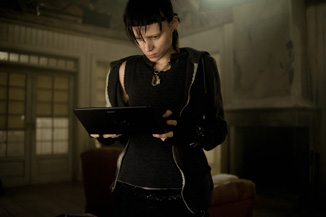|
|
Book vs. Movie vs. Movie: The Girl With the Dragon TattooBy Russ BickerstaffJanuary 2, 2012
Of particular note is Fincher’s handling of online research. The Internet has been around for a long time, and movies have tried to bring its reality to the big screen - failing pretty consistently. Prior to this movie, I don’t ever recall seeing a film so successfully bring an edgy sense of drama of Internet research to the screen. This might be the first time the Internet has looked good in film. Fincher’s careful direction (and, no doubt some really amazing cinematography by Jeff Cronenweth) make the tension of a couple of people doing computer research actually seem kind of intense and compelling in film format. Fincher and company’s handling of the rich intensity of every aspect of the film allows long bits of exposition to come across beautifully onscreen. The Zaillian script draws poetry out of the dialogue not found in the original novel and manages to crystallize certain aspects of the plot much better than Larsson did in the original novel. Yes, it IS a 158 minute film, but what it’s able to get across in 158 minutes onscreen is a lot more concise and compelling than what Larsson had in a rather exhaustive novel. Yes, there were more details and there was a lot more background in the original novel, but the drama of what was going on kind of got lost. The pacing of Fincher’s film takes a good book and makes a great film out of it. The Verdict Even if this latest film is successful enough to spawn a whole series of other Salander films, there’s little doubt that the original novel is going to be remembered far better than any movie made of it. The novels were hugely successful and have a kind of following that seems unlikely to translate into any cinematic adaptation. Produced as they were entirely in the home of the novel’s author, the original films are likely to have a special place in the hearts of Swedes and other Europeans, but Fincher’s adaptation of the original novel is simply a richer, more concise and better executed work of art than any of the rest of the work that has made it to the public thus far.
[ View other columns by Russ Bickerstaff ]
[ View other Book vs. Movie columns ]
[ Email this column ]
|

|
|
|

|
Monday, April 29, 2024
© 2024 Box Office Prophets, a division of One Of Us, Inc.


